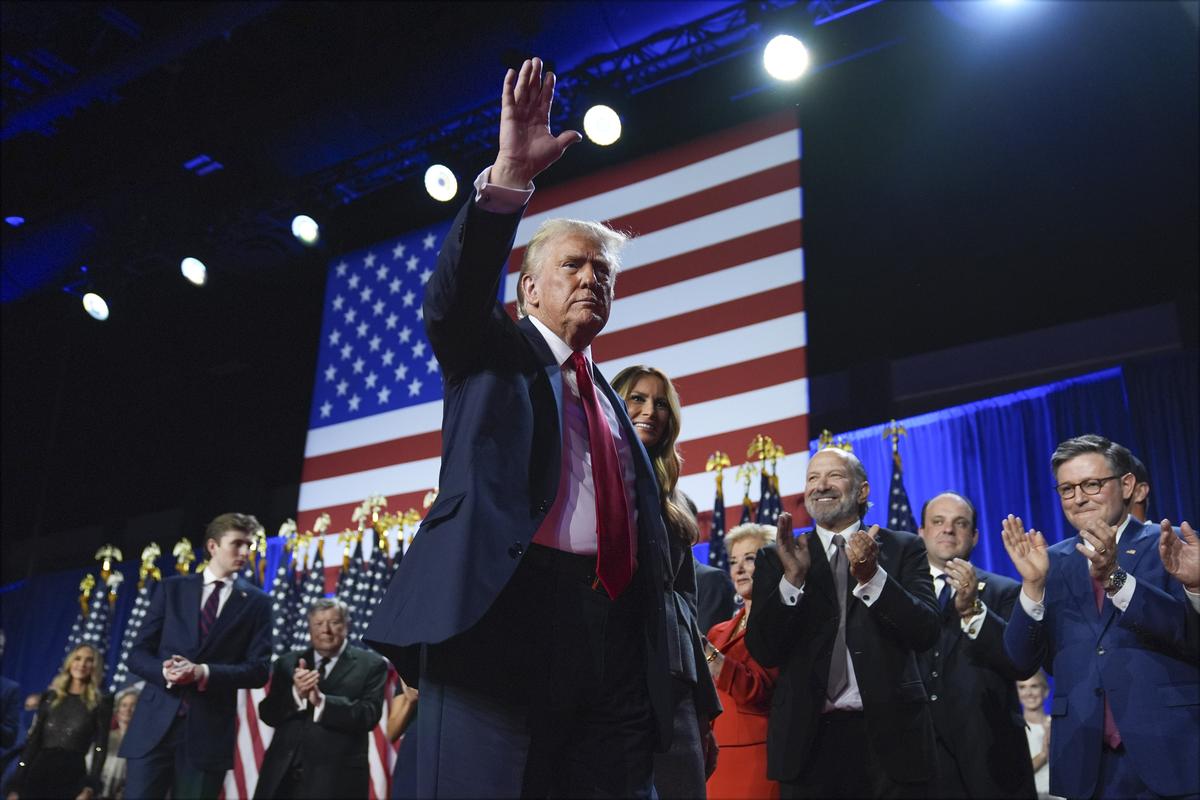Japan Speeding up Building Relations with New Trump Administration; Concerns Raised Over Impact on Security, Trade

Republican presidential nominee former President Donald Trump waves as he walks with former first lady Melania Trump at an election night watch party at the Palm Beach Convention Center, Wednesday, Nov. 6, 2024, in West Palm Beach, Fla.
2:00 JST, November 9, 2024
Voices of concern have been calling out within the government about how the victory of Donald Trump in the U.S. presidential election may affect security and trade policies.
The government hopes to minimize the impact on Japan-U.S. relations by quickly building relations with the new administration to be formed under the former Republican president and preparing measures to deal with his expected approach.
Following Thursday’s first phone talks with Trump, Prime Minister Shigeru Ishiba told reporters, “We agreed to take the Japan-U.S. alliance to an even higher level.” Ishiba plans to carefully explain Japan’s engagement in security policies to Trump.
Under his “America First” policy, Trump has demanded allies bear a greater share of the burden, and his foreign policy is unlikely to change. During his previous administration, Trump described the Japan-U.S. Security Treaty, which stipulates U.S. defense obligations to Japan, as unfair and demanded a significant increase in the so-called sympathy budget — the share that Japan shoulders for the cost of U.S. forces’ stationing in Japan.
The administration of U.S. President Joe Biden has focused on deepening the Japan-U.S. alliance, including an agreement to review the command-and-control frameworks of the Self-Defense Forces and the U.S. military. If an inward-looking attitude intensifies under Trump’s new administration, the degree of U.S. involvement in the Asia-Pacific region could also decline.
“It is necessary [for Japan] to carefully explain that Japan-U.S. cooperation contributes to regional stability and is tied to the interests of the United States,” said a senior Foreign Ministry official in Tokyo.
In terms of trade policies, Japan has a deep sense of caution toward Trump, who is averse to multilateralism. During his previous administration, the former president withdrew from the Trans-Pacific Partnership trade agreement with a view toward countering China and expressed dissatisfaction with the operation of the World Trade Organization, threatening to withdraw from the body.
Regarding bilateral trade talks, Trump has in the past suggested imposing additional tariffs on Japanese cars. Taking this into account, the government has begun preparing materials explaining how Japanese automakers contribute to employment in the United States.
“We need to carefully plan countermeasures, given the experience with the previous government,” said a senior official of an economy-related government agency.
Top Articles in Politics
-

Japan PM Takaichi’s Cabinet Resigns en Masse
-

Sanae Takaichi Elected Prime Minister of Japan; Keeps All Cabinet Appointees from Previous Term
-

Japan’s Govt to Submit Road Map for Growth Strategy in March, PM Takaichi to Announce in Upcoming Policy Speech
-

LDP Wins Historic Landslide Victory
-

LDP Wins Landslide Victory, Secures Single-party Majority; Ruling Coalition with JIP Poised to Secure Over 300 seats (UPDATE 1)
JN ACCESS RANKING
-

Producer Behind Pop Group XG Arrested for Cocaine Possession
-

Japan PM Takaichi’s Cabinet Resigns en Masse
-

Japan Institute to Use Domestic Commercial Optical Lattice Clock to Set Japan Standard Time
-

Man Infected with Measles Reportedly Dined at Restaurant in Tokyo Station
-

Israeli Ambassador to Japan Speaks about Japan’s Role in the Reconstruction of Gaza






















